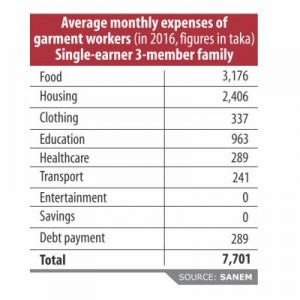Set Tk 16,000 as minimum wage
Set Tk 16,000 as minimum wage
Workers and union leaders on Saturday demanded trebling of minimum wage to Tk 16,000 for the country’s 3.6 million apparel workers given the abnormal spiral in the costs of basic commodities, accommodation and healthcare.
At present, the minimum wage for garment workers is Tk 5,300. “Although we do not fully agree with the concept of living wage, we want a big hike of the salary this time,” said Nazma Akter, president of the Sommilito Garments Sramik Federation, a garment workers’ rights group. The group has already sent a letter to the minimum wage board, which was formed last month by the government, demanding Tk 16,000 as the wage. Sima Akter and Rasheda Begum, two operators of a garment factory at Gazipur, echoed the views of Akter. 
If the salary is hiked the factory owners will also raise the production targets proportionately, Sima said. “Please also keep our physical conditions in mind when you fix the minimum wage.”
The trebling of wages is warranted as the prices of basic commodities have increased along with the house rent, said Sultana Begum, president of the Green Bangla Garments Workers Federation.
The garment workers have to buy rice at Tk 58 to Tk 60 a kilogram as the prices of the staple have shot up. “But our incomes did not increase.”
She went on to state that the prices of basic commodities and house rent are higher than in Dhaka at Gazipur, the hub for garment factories. “We cannot save any money even after sharing a room and having less nutrient food,” she added.
Khondaker Golam Moazzem, research director of the Centre for Policy Dialogue, suggested specifying the legal aspects of the wage and workers’ rights while fixing the minimum wage as sometimes the workers cannot enjoy all benefits due to ambiguities in the labour law.
For instance, there is an apprentice grade for which the minimum wage is Tk 4,200, but the factory owners often pay the entry level workers this wage instead of the correct amount of Tk 5,300.
Every time the issue of wage hike is discussed the factory management brings up the argument that they would go out of business if the workers’ salaries are raised. “Actually, this is not right — we should find out how many factories have shuttered for salary hike. Factories may close down for other reasons.”
Ideally, the minimum wage should be close to the living wage, Moazzem said.
As per the Asia Floor Wage, the living wage for garment workers is Tk 37,661 given the conditions of 2017. The current minimum wage of Tk 5,300 is just 19 percent of the living wage, he added.
“The existing minimum wage is not enough to maintain the minimum standard of living for a worker,” said Selim Raihan, a professor of the Dhaka University’s Economics department, while sharing the findings of a study at an event held at the capital’s Lakeshore Hotel yesterday.
The study — Moving towards Living Wage: What will it take? — was conducted by the South Asian Network of Economic Modelling on garment workers in Dhaka and Gazipur. It was funded by CARE Bangladesh under its OIKKO project.
A minimum widespread dwelling includes food, clothing, residence rent, education, health, entertainment, savings and so on.
Fixing Tk 5,300 as the minimal wage for employees in 2013 was once not sufficient for keeping a decent life, Raihan said. So, this time the minimum wage for garment people need to be constant following the living wage concept.
“Prices are going up day by day however now not our wages. We are now buying decrease exceptional food and grains from neighborhood shops. This is going to have an effect on our health in the long-run but we have no choice.” Between 0.5 and three percentage of the price of manufacturing a clothing item goes to the worker who made it. “This means, on an €8 t-shirt, the most a employee will get paid is 24 cents,” he added. Qazi Kholiquzzaman Ahmad, chairman of the Palli Karma- Sahayak Foundation, entreated the authorities and factory proprietors to introduce a rationing device for garment people so that they can purchase the simple commodities at subsidised rates.
Four vital elements — food, accommodation, education and fitness of people — be considered whilst fixing the wage, Ahmad said.


Leave a Reply
Want to join the discussion?Feel free to contribute!